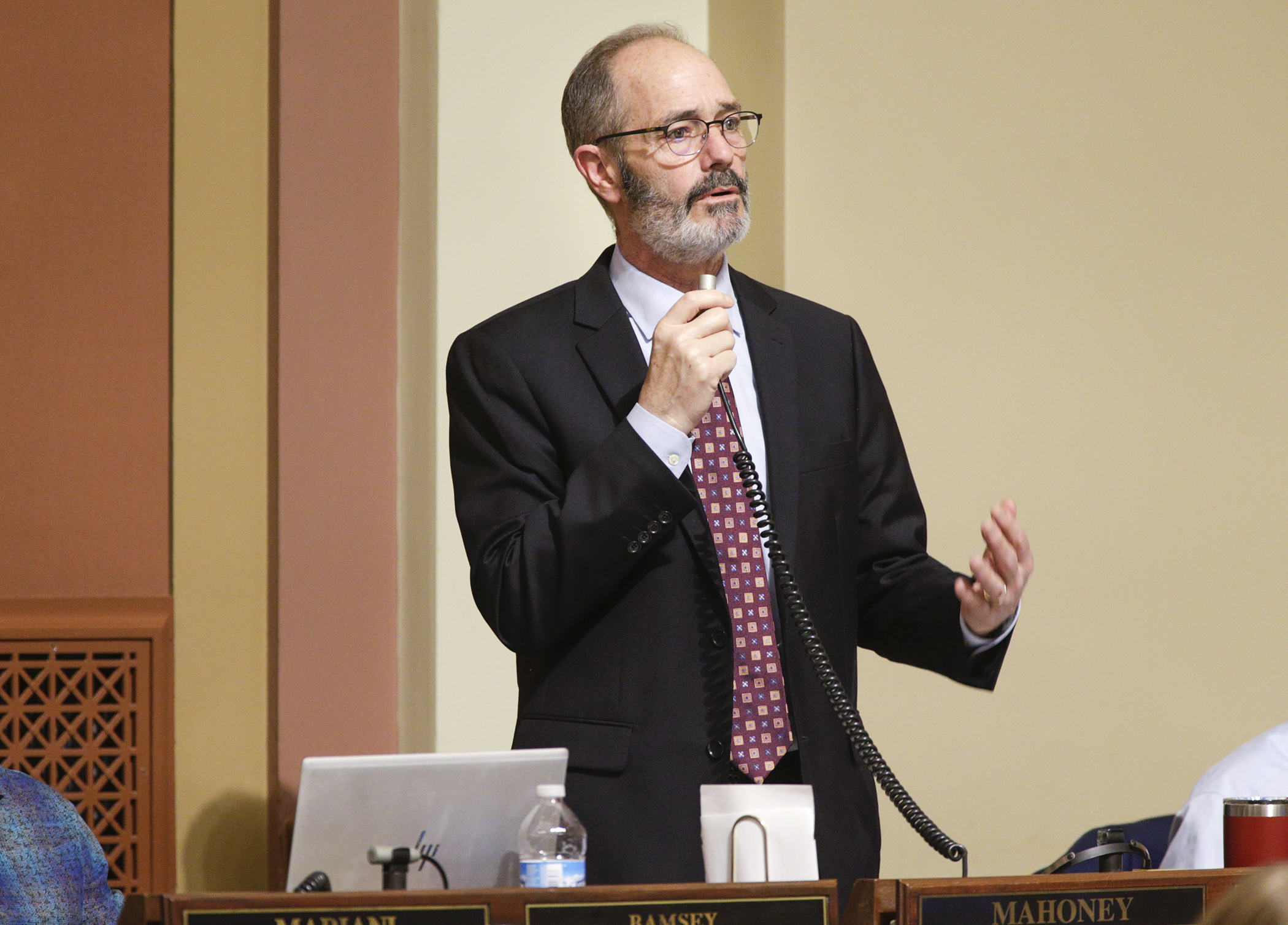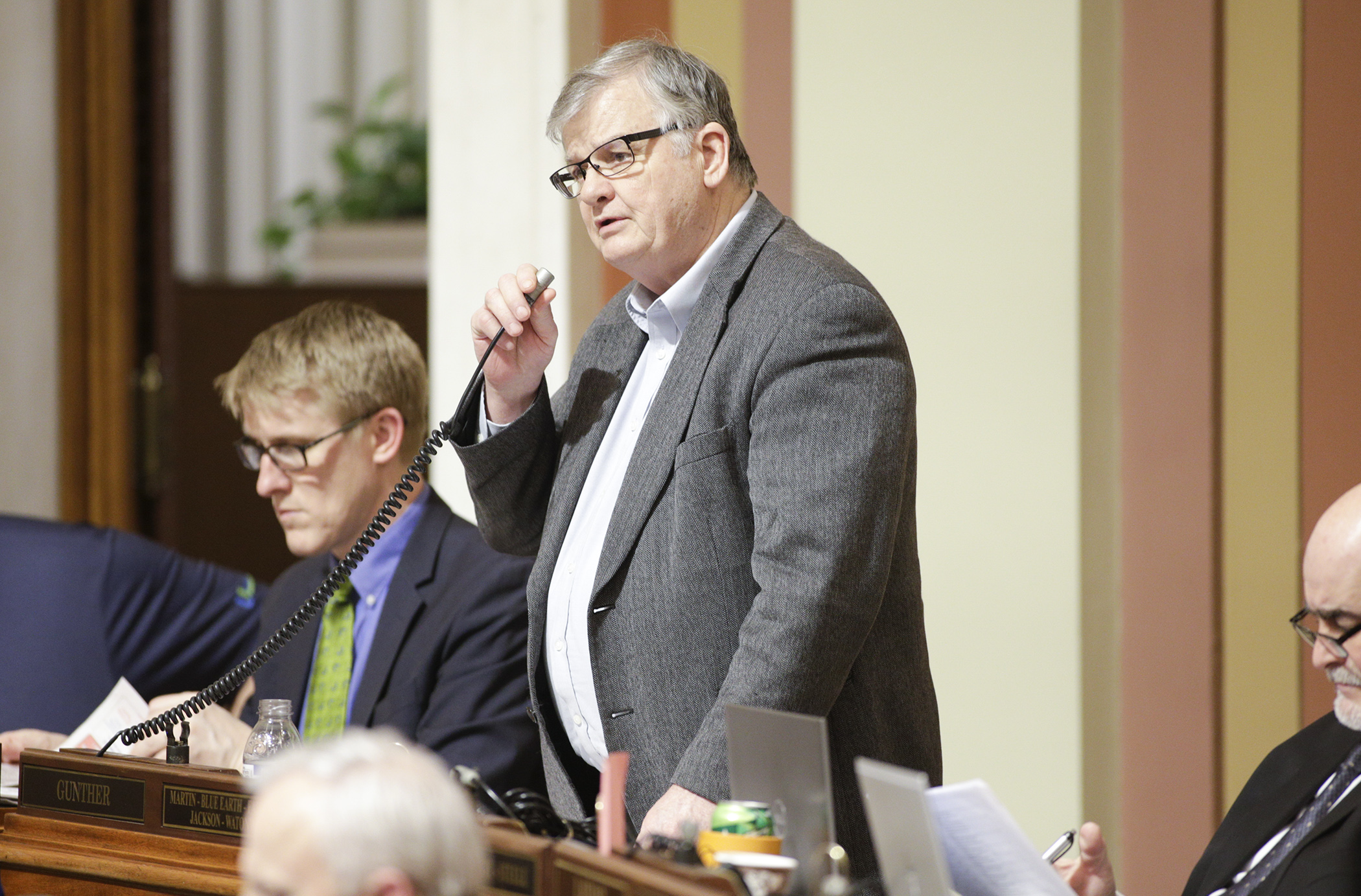Major disagreements remain on key issues in jobs omnibus; floor debate to continue Wednesday

Dissent remains regarding key provisions in the omnibus jobs and economic development, energy and climate, and telecommunications policy and finance bill.
As does a vote, as the House adjourned just before midnight, following a two-hour debate, so members could sleep before resuming discussion Wednesday morning.
If approved, HF2208, which is sponsored by Rep. Tim Mahoney (DFL-St. Paul), will head to the Senate, where it is sponsored by Sen. Eric Pratt (R-Prior Lake).
The bill combines the work of a few different House divisions, including the House Jobs and Economic Development Finance Division, the House Energy and Climate Finance and Policy Division, and the Greater Minnesota Jobs and Economic Development Finance Division.
Supporters have praised the bill for the number and range of employment and economic development programs it supports, but expressed disappointment regarding funding limitations.
One major element of the bill that garnered enthusiastic floor discussion is the paid family medical leave program outlined in HF5, sponsored by Rep. Laurie Halverson (DFL-Eagan).
The program is expected to cost $31.99 million over the 2020-21 biennium, with an additional $533,000 for outreach, education, and technical assistance for employees and employers.
 Rep. Bob Gunther offers an amendment to HF2208, the omnibus jobs and economic development bill, during floor debate April 23. Photo by Paul Battaglia
Rep. Bob Gunther offers an amendment to HF2208, the omnibus jobs and economic development bill, during floor debate April 23. Photo by Paul BattagliaAn amendment successfully offered by Mahoney, would provide “a little more flexibility” for businesses that provide private leave options and make other technical fixes, he said.
Rep. Barb Haley (R-Red Wing) unsuccessfully offered an amendment to the amendment that would have made it even easier for businesses to get private plans approved. Business owners warned her the proposed legislation, in its current form, could have “unintended consequences” and compel them to cut other benefits, she said.
Halverson said Haley’s addition was “unnecessary,” as sufficient flexibility for employers had already been built into the program “so that they can offer a private plan that works for them and their employees.”
Republicans also expressed reservations regarding the bill’s sick and safe time provision – as originally outlined in HF11 by Rep. John Lesch (DFL-St. Paul) – citing the potential financial strain that it could inflict on small businesses.
Rep. Bob Gunther (R-Fairmont) and House Minority Leader Kurt Daudt (R-Crown) offered a couple of amendments focused on improving reporting and increasing the oversight of grant programs, which received bipartisan support and were approved. While supportive of the initiatives, Mahoney said that he remains concerned about the House’s ability to secure the additional funding needed to support them.
Other notable finance provisions in the bill would provide:
- $75.88 million for vocational rehabilitation services, an $8 million increase over the biennium;
- $70 million to fund the Border to Border Broadband Development Grant Program;
- $12.29 million to fund the Pathways to Prosperity adult workforce competitive grant program;
- $10 million in need-based relief grants for dairy producers, to be awarded through the Department of Agriculture;
- $2.87 million to support the establishment of child care businesses through WomenVenture, MN Initiative Foundations, and Child Care Economic Development Grants;
- $2 million to each of the following: Youthprise, Ujamaa Place, Latino Communities United in Service, and the Hmong American Partnership;
- $1.5 million to provide support services competitive grant funding;
- $1.31 million to support the enforcement of wage theft prevention measures in the bill;
- $800,000 to Helmets to Hardhats;
- $700,000 to the International Institute of Minnesota;
- $250,000 for a statewide education and outreach campaign focused on senior fraud prevention; and
- $20,000 to prepare an inventory of workforce development programs in the state.
Many of the programs funded in the bill focus on workforce development initiatives in Greater Minnesota, or are required to use a portions of their funding to serve communities outside the metro area.
Some notable policy provisions would:
- increase employer penalties for wage theft and strengthen the Department of Labor’s enforcement ability;
- require DEED to produce a report on employment barriers for people with mental illnesses;
- establish a pilot project to help special education students transition into employment after graduation;
- clarify statutory language to improve the accessibility of public buildings;
- allow bus drivers who work under contracts with schools to be considered eligible for unemployment insurance benefits during the summers; and
- create a designated student loan advocate within the Department of Commerce.
Energy would become increasingly renewable under bill
Policies that mandate the use of energy from solar, wind, hydroelectric and biomass sources are a central part of the section of the bill devoted to energy and climate. It also promotes electrification as a means toward reducing greenhouse gas emissions in the state.
The sections of the omnibus bill related to energy and climate closely mirror those in HF1833, the omnibus bill approved by the House Energy and Climate Finance and Policy Division. But there would be significant increases in appropriations for some programs under HF2208.
For example, funding for a rebate program for purchasers of electric vehicles would increase by about 50 percent to $10.4 million. The amount allocated to the Metropolitan Council for the purchase of electric buses in Fiscal Year 2019 would increase by 60 percent to $8 million.
Among other energy-related appropriations for the next biennium would be:
- $56.8 million for the Petroleum Tank Release Cleanup Fund;
- $16 million for the “Solar on Schools” program, assisting school districts in converting to solar energy;
- $8.9 million for the Made in Minnesota Solar Incentive Program;
- $6 million each to the University of Minnesota and Minnesota State for their transitions to renewable energy sources;
- $5 million to expand and extend Xcel Energy’s Solar Rewards program;
- $5 million for the Prairie Island Indian Community to move toward becoming a “net zero energy” user;
- $3.5 million for installation of solar devices in state parks; and
- $2.5 million for a revolving loan fund for electric vehicle charging stations.
Session Daily Writer Rob Hubbard contributed to this story.
Related Articles
Search Session Daily
Advanced Search OptionsPriority Dailies
Ways and Means Committee OKs proposed $512 million supplemental budget on party-line vote
By Mike Cook Meeting more needs or fiscal irresponsibility is one way to sum up the differences among the two parties on a supplemental spending package a year after a $72 billion state budg...
Meeting more needs or fiscal irresponsibility is one way to sum up the differences among the two parties on a supplemental spending package a year after a $72 billion state budg...
Minnesota’s projected budget surplus balloons to $3.7 billion, but fiscal pressure still looms
By Rob Hubbard Just as Minnesota has experienced a warmer winter than usual, so has the state’s budget outlook warmed over the past few months.
On Thursday, Minnesota Management and Budget...
Just as Minnesota has experienced a warmer winter than usual, so has the state’s budget outlook warmed over the past few months.
On Thursday, Minnesota Management and Budget...